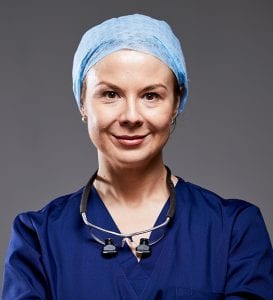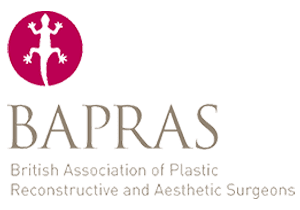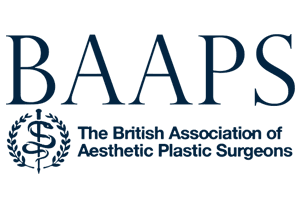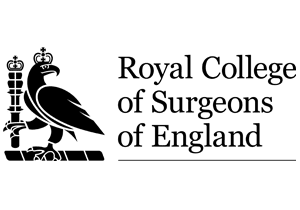
Table of Contents
- What You Should Know before Your Labiaplasty Surgery
- Download the Labiaplasty Guide
- Question 1: What are your qualifications and experience with labiaplasty?
- Question 2: Am I a good candidate for labiaplasty?
- Question 3: What technique do you recommend for my specific case?
- Question 4: What are the potential risks and complications?
- Question 5: How should I prepare for the surgery?
- Question 6: What can I expect during the recovery period?
- Question 7: Will labiaplasty affect sensitivity or sexual function?
- Question 8: How natural will the results look?
- Question 9: What is the cost, and is financing available?
- Question 10: How can I maintain the results long-term?
- Further Reading about Labiaplasty with Chester Consultant Plastic Surgeon Anca Breahna
- Medical References for Labiaplasty
What You Should Know before Your Labiaplasty Surgery
If you are considering labiaplasty surgery, you probably have a lot of questions and concerns regarding the procedure. The initial consultation with your plastic surgeon is a good opportunity to find answers to many of your questions. But to make the most out of this meeting, you should go prepared. And this is why we created a list with popular questions to ask your surgeon before labiaplasty surgery.
As a Consultant Plastic Surgeon with many years of experience, Anca Breahna believes in the power of open communication between surgeon and patient. By asking the right questions, you not only gain valuable insights but also establish a foundation of trust with your surgeon.
Download the Labiaplasty Guide
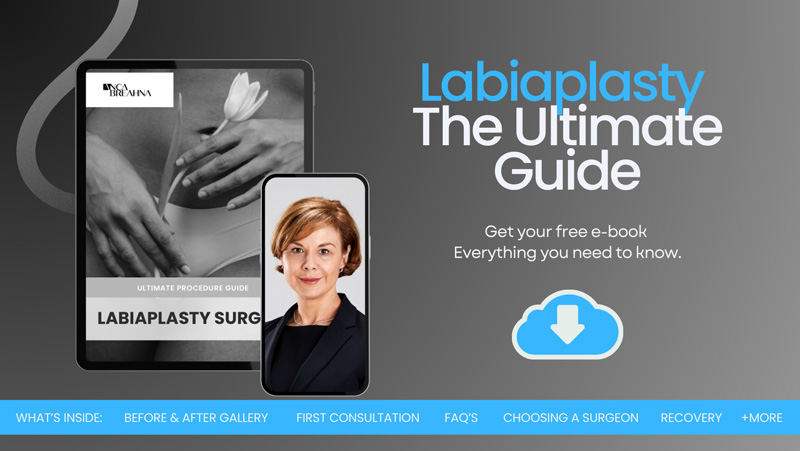
Question 1: What are your qualifications and experience with labiaplasty?
When it comes to any surgical procedure, especially one as delicate as labiaplasty, the qualifications and experience of your surgeon are essential. Don’t hesitate to ask about your surgeon’s background, training, and specific experience with labiaplasty procedures.
Keep in mind that a qualified and experienced surgeon should be more than willing to discuss their background and show you before-and-after photos of their work (with patient consent, of course). This transparency helps build trust and ensures you’re in capable hands.
Question 2: Am I a good candidate for labiaplasty?
Determining whether you’re a suitable candidate for labiaplasty involves considering both physical and psychological factors. During your consultation, you’ll discuss your motivations for seeking the surgery, your overall health, and your expectations.
Physically, good candidates for labiaplasty are generally:
- In good overall health
- Non-smokers or willing to quit before surgery
- At a stable weight
- Experiencing physical discomfort due to enlarged labia (e.g., during exercise or intimate activities)
- Unhappy with the appearance of their labia
Psychologically, ihttps://cheshirecosmeticsurgery.com/blog/body-condition-enlarged-labiat’s important that you:
- Have realistic expectations about the outcomes of the surgery
- Are doing this for yourself, not to please someone else
- Understand the risks and potential complications
- Are in a stable emotional state
Make sure to have an honest conversation about your reasons for considering labiaplasty. Whether it’s to alleviate physical discomfort, boost your self-confidence, or both, it’s important that you’re making this decision for yourself.
It’s also worth noting that if you’re planning future pregnancies, you might discuss the timing of your surgery, as childbirth can potentially affect the results.
Question 3: What technique do you recommend for my specific case?
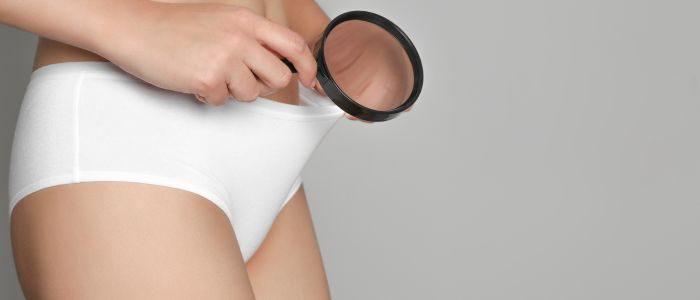
Labiaplasty is not a one-size-fits-all procedure. There are several techniques available, and the best approach depends on your individual anatomy and desired outcomes. During your consultation, you’ll discuss the various options and determine which is most suitable for you.
Some common labiaplasty techniques include:
- Trim Method: This involves removing excess tissue along the edge of the labia minora. It’s straightforward and effective but may result in a slightly less natural-looking edge.
- Wedge Method: A V-shaped wedge of tissue is removed from the thickest part of the labia, and the edges are sutured together. This preserves the natural border of the labia.
- De-epithelialisation: This technique removes excess tissue from the inner portion of the labia, preserving the outer edge. It’s particularly useful for patients with thick labia.
- Composite Reduction: This combines elements of the trim and wedge methods for a customised approach.
In your case, after a thorough examination and discussion of your goals, Anca might recommend one technique or the other. The approach would address your specific concerns while maintaining a natural appearance and preserving sensation. The goal is not just to reduce size, but to create a balanced, natural-looking result that alleviates any physical discomfort and meets your aesthetic goals.
Question 4: What are the potential risks and complications?
As with any surgical procedure, labiaplasty carries certain risks and potential complications. It’s important to have a frank discussion about these so you can make an informed decision. While serious complications are rare, especially when the surgery is performed by a qualified plastic surgeon, it’s important to be aware of the possibilities.
Potential risks and complications of labiaplasty include:
- Bleeding or haematoma (collection of blood)
- Infection
- Delayed wound healing
- Asymmetry
- Over or under-correction
- Scarring
- Changes in sensation
- Dissatisfaction with aesthetic results
- Pain during intercourse (usually temporary)
- Need for revision surgery
In her practice, Anca takes several measures to minimise these risks:
- Thorough pre-operative assessment to ensure you’re a suitable candidate
- Use of advanced surgical techniques to preserve blood supply and nerve endings
- Strict adherence to sterilisation protocols
- Detailed post-operative care instructions
- Close follow-up to monitor your healing process
Question 5: How should I prepare for the surgery?
Proper preparation can significantly impact the success of your surgery and your recovery process. Here are some steps to prepare for your labiaplasty:
- Medical Evaluation: You’ll need to undergo a thorough medical evaluation, including blood tests, to ensure you’re fit for surgery.
- Medication Adjustments: You may need to stop taking certain medications, especially blood thinners, before surgery. We’ll provide a detailed list of medications to avoid.
- Quit Smoking: If you smoke, you’ll need to quit at least four weeks before surgery and throughout your recovery. Smoking can significantly impair healing.
- Arrange Support: Plan for someone to drive you home after surgery and stay with you for at least the first 24 hours.
- Prepare Your Recovery Space: Set up a comfortable recovery area at home with essentials within easy reach.
- Stock Up on Supplies: Purchase recommended post-operative supplies like sanitary pads, loose-fitting underwear, and ice packs.
- Maintain a Healthy Diet: Eat a balanced diet rich in vitamins and minerals to support healing.
- Stay Hydrated: Increase your water intake in the weeks leading up to surgery.
- Avoid Alcohol: Refrain from alcohol consumption for at least a week before surgery.
- Follow Fasting Instructions: You’ll need to fast for a certain period before surgery. We’ll provide specific instructions based on your surgery time.
You should know that the better prepared you are, the smoother your surgery and recovery process will be.
Question 6: What can I expect during the recovery period?
Everyone’s recovery is unique, but here’s a general timeline of what you can expect:
Immediate Post-Op:
- You’ll spend a few hours in recovery before being discharged
- Some discomfort, swelling, and bruising are normal
- You’ll be provided with pain medication and antibiotics
First Week:
- Rest is crucial; avoid strenuous activities
- Apply ice packs to reduce swelling
- Wear loose-fitting clothing and sanitary pads
- Mild bleeding or spotting is normal
- Keep the area clean and dry
Weeks 2-4:
- Swelling and discomfort should gradually subside
- You can usually return to work after 1-2 weeks, depending on your job
- Continue to avoid strenuous activities and sexual intercourse
Weeks 4-6:
- Most swelling should have resolved
- You can typically resume exercise and sexual activity (with approval)
- Scars will continue to fade
Long-term:
- Final results become apparent after 3-6 months
- Scars continue to improve for up to a year
Throughout your recovery, you’ll have follow-up appointments to monitor your progress. We’re always available to address any concerns you may have during your healing process.
Question 7: Will labiaplasty affect sensitivity or sexual function?
This is a common and very important question. Labiaplasty, when performed correctly, should not negatively impact sensitivity or sexual function. In fact, many women report improved sexual experiences due to increased comfort and confidence.
Here’s what you need to know:
- Sensation: The labia are rich in nerve endings, and great care is taken during surgery to preserve these. Some patients may experience temporary changes in sensation, such as numbness or hypersensitivity, but this usually resolves within a few months.
- Sexual Function: Labiaplasty doesn’t directly affect sexual function. The clitoris and vaginal opening are not altered during the procedure. Many women find that removing excess labial tissue actually enhances their sexual experiences by reducing discomfort and self-consciousness.
- Arousal: The ability to become aroused should not be affected. The tissues responsible for sexual arousal are not altered during labiaplasty.
- Orgasm: The ability to achieve orgasm should remain unchanged. If anything, some women report more intense orgasms due to increased comfort and confidence.
- Lubrication: Labiaplasty does not affect the body’s ability to produce natural lubrication.
It’s important to note that while physical changes can be made through surgery, psychological factors play a significant role in sexual satisfaction.
Keep in mind that you should wait until you’re fully healed (typically 4-6 weeks) before resuming sexual activity. We’ll discuss this in more detail during your post-operative appointments.
Question 8: How natural will the results look?
Achieving natural-looking results is a top priority in labiaplasty surgery. The goal is to create a balanced, proportionate appearance that looks and feels natural to you.
Here’s what you can expect:
- Symmetry: Anca aims for a balanced appearance between the left and right labia.
- Size: The labia will be reduced to a size that’s proportionate to your overall anatomy. The aim is not to remove the labia entirely, but to create a size that’s comfortable and aesthetically pleasing.
- Colour and Texture: The natural colour and texture of your labia will be preserved as much as possible. Any scars are usually well-hidden in the natural folds of the tissue.
- Edge Appearance: Depending on the technique used, the edges of the labia can be preserved or recreated to maintain a natural look.
- Overall Aesthetics: The result should blend seamlessly with your natural anatomy, enhancing rather than altering your individual appearance.
To give you a better idea of potential results, Anca can show you before-and-after photos of previous patients (with their consent, of course). These can help you understand the range of possible outcomes and set realistic expectations.
It’s important to remember that everyone’s anatomy is unique, and what looks “natural” can vary from person to person. During your consultations, Anca will discuss your specific goals and how she can achieve a result that looks and feels natural to you.
Question 9: What is the cost, and is financing available?

Discussing the financial aspects of surgery is an important part of the decision-making process. The cost of labiaplasty can vary depending on several factors, including the complexity of the procedure, the technique used, and whether it’s combined with other surgeries.
In the UK, the cost of labiaplasty typically ranges from £3,000 to £5,000. This usually includes:
- Surgeon’s fee
- Anaesthesia fees
- Operating room costs
- Pre- and post-operative care
It’s important to note that this is an estimate, and the team can provide you with a more accurate quote after your consultation.
Question 10: How can I maintain the results long-term?
Maintaining the results of your labiaplasty is relatively straightforward, but it does require some care and attention. Here are some tips to help you preserve your results for the long term:
- Healthy Lifestyle: Maintaining a stable weight through a balanced diet and regular exercise can help prevent significant changes to your body, including the labia.
- Gentle Cleansing: Use mild, unscented soaps to clean the area. Avoid harsh chemicals or excessive scrubbing, which can irritate the delicate tissues.
- Moisturise: Once fully healed, you can use a gentle, fragrance-free moisturiser to keep the skin soft and supple.
- Wear Comfortable Clothing: Opt for breathable, cotton underwear and avoid overly tight clothing that might cause friction or irritation.
- Safe Sex Practices: Use lubrication during intercourse to minimise friction and potential irritation.
- Regular Check-ups: Attend your scheduled follow-up appointments and continue with regular gynaecological check-ups.
- Pregnancy Considerations: If you become pregnant after labiaplasty, be aware that childbirth might affect the results. You can discuss potential revisions if needed after you’ve completed your family.
- Sun Protection: If you sunbathe nude, apply sunscreen to the area to prevent discolouration.
- Avoid Smoking: Smoking can affect skin quality and healing, so it’s best to avoid it for optimal long-term results.
- Stay Hydrated: Drinking plenty of water helps maintain overall skin health, including in the genital area.
Further Reading about Labiaplasty with Chester Consultant Plastic Surgeon Anca Breahna
- Read more about Labiaplasty Types – Trim Labiaplasty and Wedge Labiaplasty or Hybrid
- Read more about Labiaplasty vs Vaginoplasty
- Read more about Scars after Labiaplasty
- Read more about Recovery after Labiaplasty
- Read more about Exercise after Labiaplasty
Medical References for Labiaplasty
- Motivations, Expectations, and Experiences of Labiaplasty
- New Study Explores Symptomatology, Quality of Life Before and After Labiaplasty
- Psychological Outcomes of Labiaplasty: A Prospective Study
- Aesthetic labia minora and clitoral hood reduction using extended central wedge resection
- Anatomy and Aesthetics of the Labia Minora: The Ideal Vulva?
